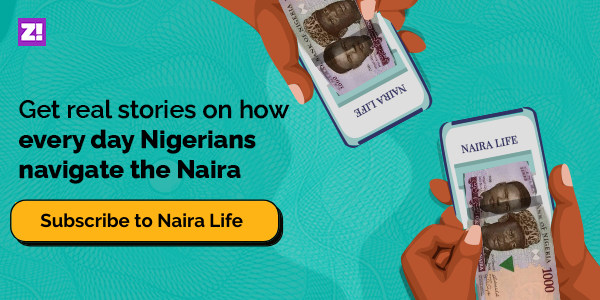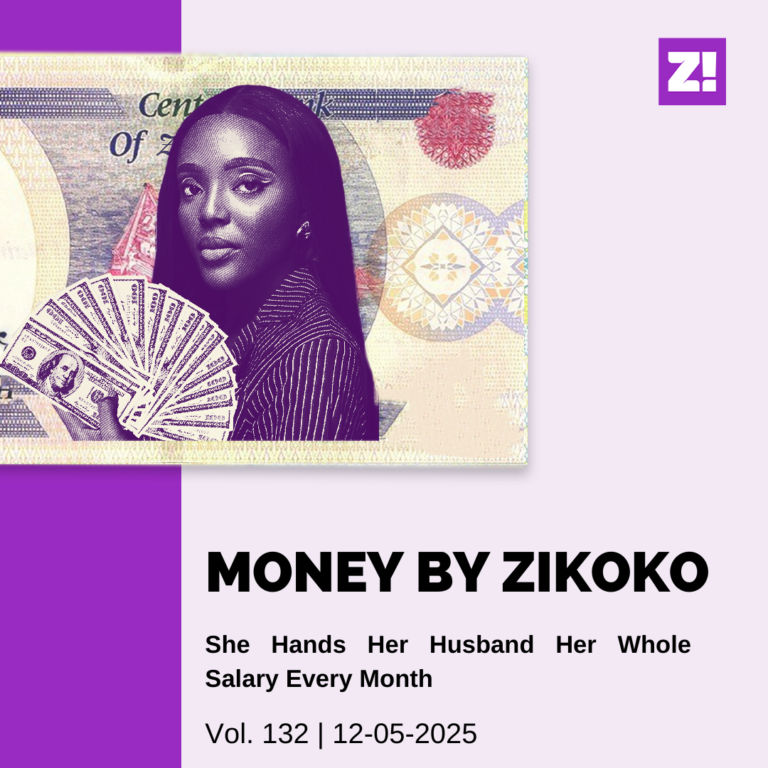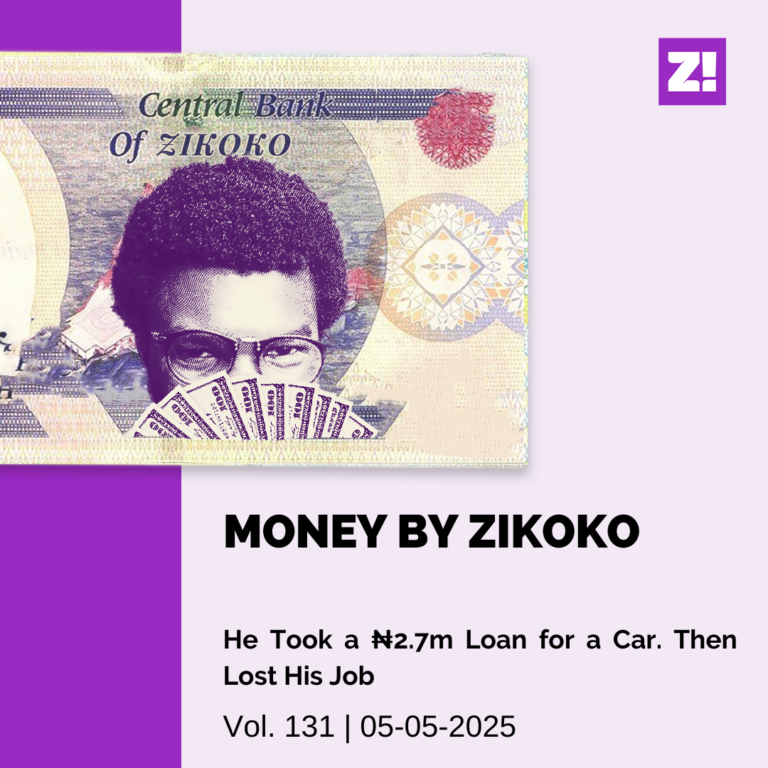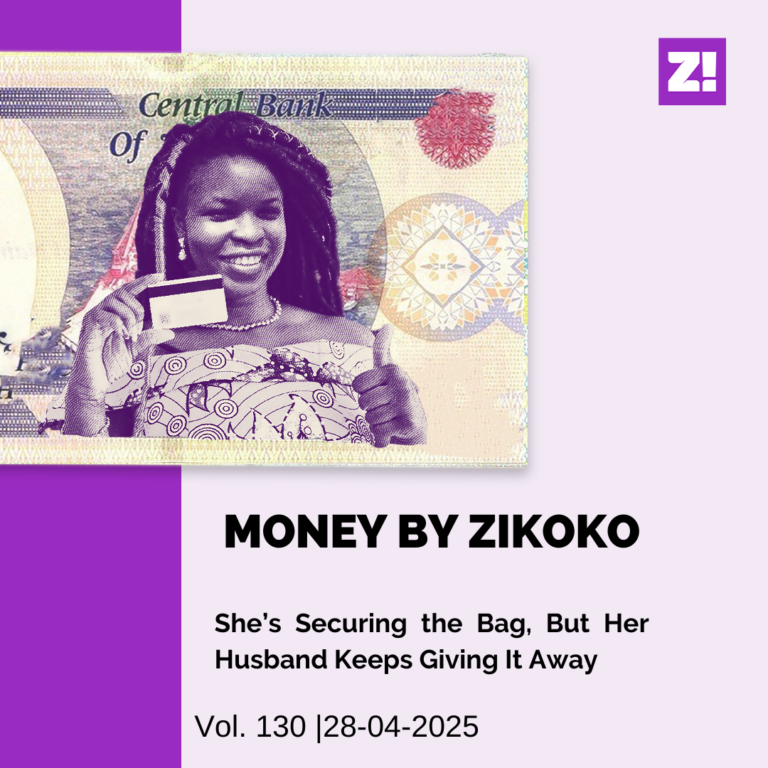Every week, Zikoko seeks to understand how people move the Naira in and out of their lives. Some stories will be struggle-ish, others will be bougie. All the time, it’ll be revealing.
It’s not every time someone turns their life around at their first job, but that’s what happened for the guy in this week’s story. From being unemployed at the beginning of 2020 to earning ₦327k/month by the middle of 2021. This is how it happened.
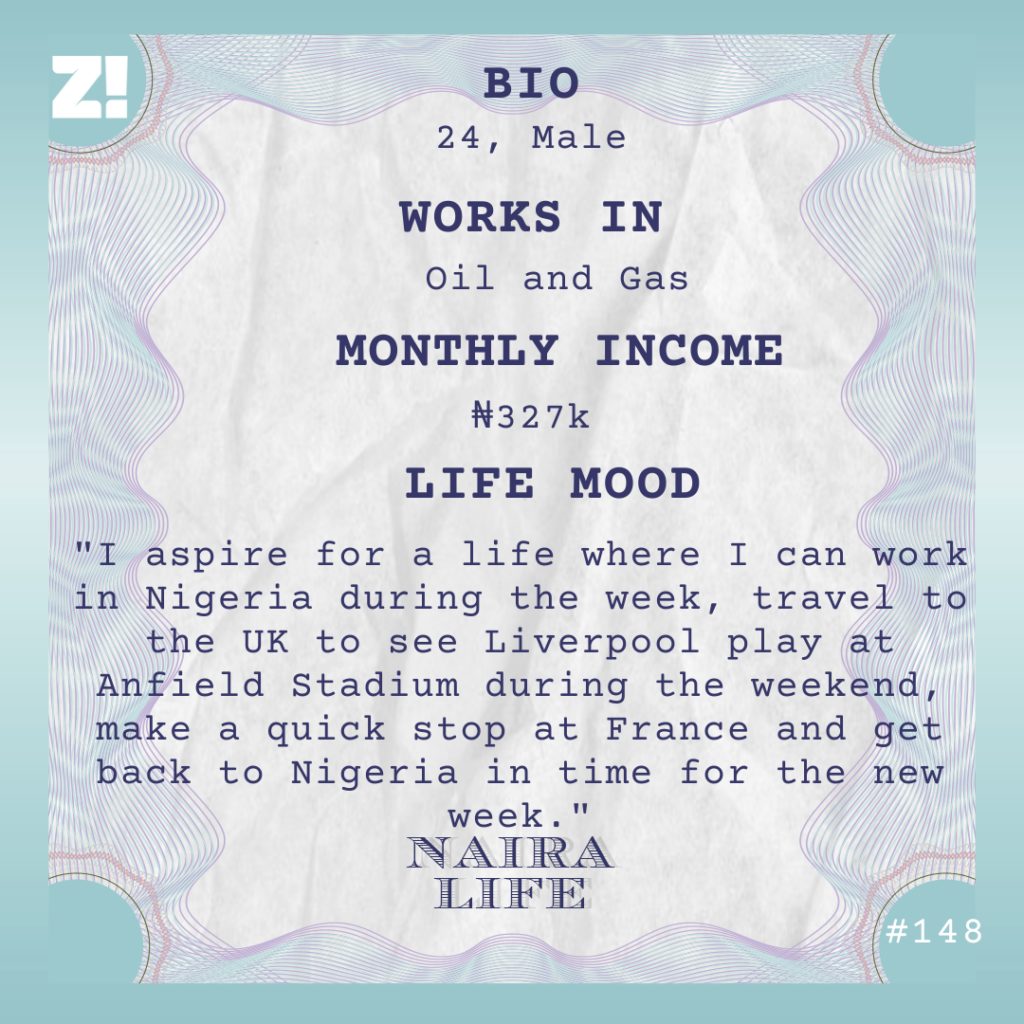
What’s your oldest memory of money?
My dad — before he passed — used to have a lot of his friends over at our house, and they would dash me money when they were leaving. This was anything from ₦20 to ₦50. My mum collected the money, and I knew enough to forget about it the moment she “kept” it for me.
Haha. I know this racket.
You know. I started getting money I could keep when I got older. I spent the first two years of secondary school in the hostel and the bulk of my monthly allowance was with my housemaster. He would give me between ₦20 and ₦50 every day during break time.
You mentioned that your dad passed earlier. When did this happen?
2002. Subsequently, we had to rely on what my mum earned as a teacher. This came with a couple of changes. We moved from a 3-bedroom apartment to a room and parlour and my mum sold her car.
I realised quickly that my mum had good financial management. Before she got her salary at the end of the month, she would draw up a budget of what the money was going into. I didn’t understand at the time, but I knew it had to be important if she did it every month. In 2004, she saved enough money to buy a piece of land. Two years later, we moved into the building.
Nice.
It still puzzles me how she managed to do it all because she also made sure my younger brother and I remained in private schools when my dad died. I imagine she took some loans to make sure things didn’t break. It was a lot for her, but she made it work. She’s also big on education, so I had only one job: do well at school and go to university. She wouldn’t have it any other way.
Fair enough. When did you get into uni?
2012. I studied biological sciences. A few weeks after I started classes, I saw an opportunity to make money.
Tell me about it.
I was taking a course that had lots of technical drawing assignments. I was good at this, but I didn’t think much of it until someone who had failed the course the previous year asked me to help them with an assignment. I agreed and they paid me ₦1500 for my troubles. I thought that was it until they referred someone else to me, and that person paid me too. I had nothing to lose, so I started taking more of these assignments. As the topics became more complex, I charged more. At the peak of it, I was getting between ₦10k and ₦15k from this. Unfortunately, it was only a semester course and the money stopped coming in when I resumed for the second semester.
What did that mean for you?
I had to start living on my monthly allowance, which was ₦5k. It was consistent at first, but when I got to 200 level, things changed a bit. The government wasn’t paying my mum her salary regularly, so she didn’t have much money to send me. Sometimes, I could go close to two months without getting anything from home, and when it came, it might not be up to ₦5k.
That would have taken some getting used to. How did you navigate this?
There was always food at home. I went to school in the same town we lived in, so all I had to do was find my way home and get food supplies. Most of my expenses were tied to transportation. If I didn’t have enough money to board a cab to school, I trekked the distance using a shortcut.
It also helped that I was a conservative spender. Before I made a decision to spend money on anything, I would think about it for some time. If I couldn’t justify the need, I wouldn’t spend the money.
Do you want to talk about what your finances looked like when you graduated from university?
Vibes and Insha Allah. There were hardly any job opportunities for students or even graduates where I lived. When I graduated from university in 2017, I returned to the house and stayed there until it was time to go for NYSC. This was April 2018.
I was posted to the north, but I relocated to the southwest. My place of primary assignment was a government-owned school. Now, I had two income sources.
What were they?
The federal government allowance and the state allowance — the state government paid corps members working in government organisations 4k.
And this brought your monthly earnings to ₦23,800?
Exactly. I lived on the state government allowance and saved the federal government allowance. It helped that the city I served had a low cost of living. My major expenses were transportation and feeding, and the ₦4k was enough to take care of this. I have to mention that I cooked my meals though.
At first, I was saving for a phone, which I bought after three months. Then my savings goal changed. The plan was to save towards japa. I had my eyes on a country in Europe for my master’s, and I wanted to have something to start the process before I involved my mum.
At the end of my service year in March 2019, I had about ₦150,000 in my savings. The first thing I did was to get my passport. Then I started applying to schools.
Something else happened: my mum sent a broadcast message on WhatsApp to me. It was a job vacancy at an oil company. My first instinct was to ignore it, but she persuaded me to apply. Although I did this, my focus was on my masters’ applications.
I spent hours on Nairaland researching how to apply to schools abroad. I applied to more than 20 schools. By July, I had six admission offers. Tuition is free in Germany, but I still needed to show that I could afford to take care of myself when I got there. That’s how I started looking for proof of funds money, which was ₦4m at that time. By August, I had only ₦1m — a loan my mum took for me. Six months later, I still hadn’t gotten the rest of the money. The embassy eventually rejected my application in January 2020. I had put my heart into it, so naturally, I was crushed.
I’m sorry about that.
It lasted for a short time. When I got the visa denial mail, I started looking for scholarship opportunities in Europe and Asia. But I didn’t have to do this for long.
Why, what happened?
Remember the job I applied for in March 2019? I wrote the exam in June and went for an interview in July. The trail went cold after that, and I didn’t bother about it. Out of the blue, I got an email from them in February with an offer letter. It was a complete surprise. Immediately I saw it, I was like “I’m ditching study plans for now.”
LMAO. How much did they offer to pay you?
My monthly basic net was ₦114k. I had never earned a six-figure salary and that made it so exciting. I resumed the job in May. We worked remotely until December when I was posted to one of the facilities in the south. Now, a couple of interesting things happened during that time.
Tell me.
I knew the greatest perk of the job was the allowances, but I didn’t know how much it would be. They paid the first one in July, and my take-home that month was about ₦300k.
Do you know what it was for?
It was for some allowances they paid in arrears. When I was confirmed three months later, my monthly pay increased to about ₦200k — basic pay and monthly allowances, minus the deductions — which are mostly taxes and dues.
Also, I learned something about the salary structure. Every staff on the payroll gets a lump sum at the beginning of the year: the management holds off on paying some allowances until the beginning of each year. Since I joined in May, they were going to pay the lump sum allowances for 2020 in arrears at the end of the year. There were some delays but they came in January.
How much?
About ₦2m — it’s money for rent, security, home appliances and a couple of other things. I remember thinking “So I’m a millionaire like this. The lump sum allowances for 2021 came a few days later. Sha, I had more than ₦ 5m in my account before the week was over.
Omo. I’m curious about what you do for them
Ah, I’m still an entry-level staff, and I haven’t been fully posted to a department yet. That won’t happen until December this year. At the moment, I work in operations where I ensure proper maintenance of equipment and facilities and other safety responsibilities.
Anyway, at the beginning of the year, I knew what my financial plan for the rest of the year would look like.
What did your plan look like?
First, save in dollars, and I decided to use PiggyVest dollar wallet for this. Secondly, invest in dollars — RiseVest plans covered this. Thirdly, set some money aside for personal development.
How much did you put into all of this at that point?
PiggyVest dollar wallet: ₦500k
Risevest: ₦1m
Personal development: ₦1m.
Also, I made a downpayment of ₦250k for a real estate investment. I bought three plots of land, and it costs ₦3m. I spread the balance over 24 months. I’ll finish paying that in June 2022.
Lit. Let’s talk about 2021.
My net salary changed in January. There was an increase in tax, so an extra ₦5k was deducted from my salary. In the same month, they started paying me a hazard allowance, and this brought my take-home to ₦236k. Nothing else happened until July.
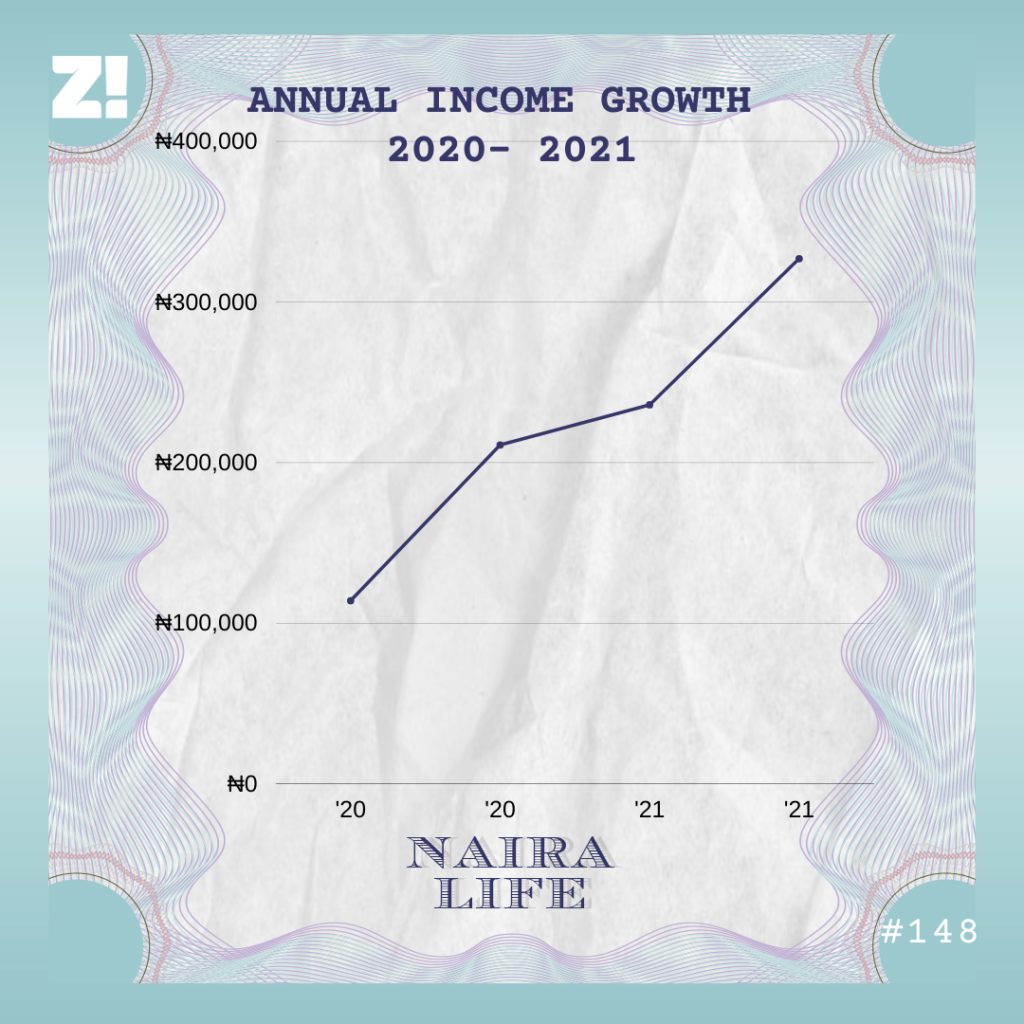
What happened in July?
The staff union had been negotiating a new pay with the management. They reached an agreement in March, and it went into effect the same month. But they didn’t start paying until July, so they had to pay us the outstanding amount in arrears.
What did this mean for you?
My gross salary increased by ₦120k, subject to the usual deductions. Since that time, my monthly net has been ₦327k.
Rooting for you oh. What do you do when your salary comes in?
I receive ₦287k every month because I’m in cooperative savings at work, and they deduct ₦40k from my salary before it gets to me. I have this trick I use, which I learned from a Naira Life story from last year — the 30:30:30:10 formula.
An OG.
30% — savings
30% — living expenses
30% — disposable income
10% — benevolence
Basically, ₦86k goes into my core savings, I send another ₦86k to my rent target savings account, and I live on ₦86k for the rest of the month.
Sweet. Can we attempt a breakdown of your disposable income?
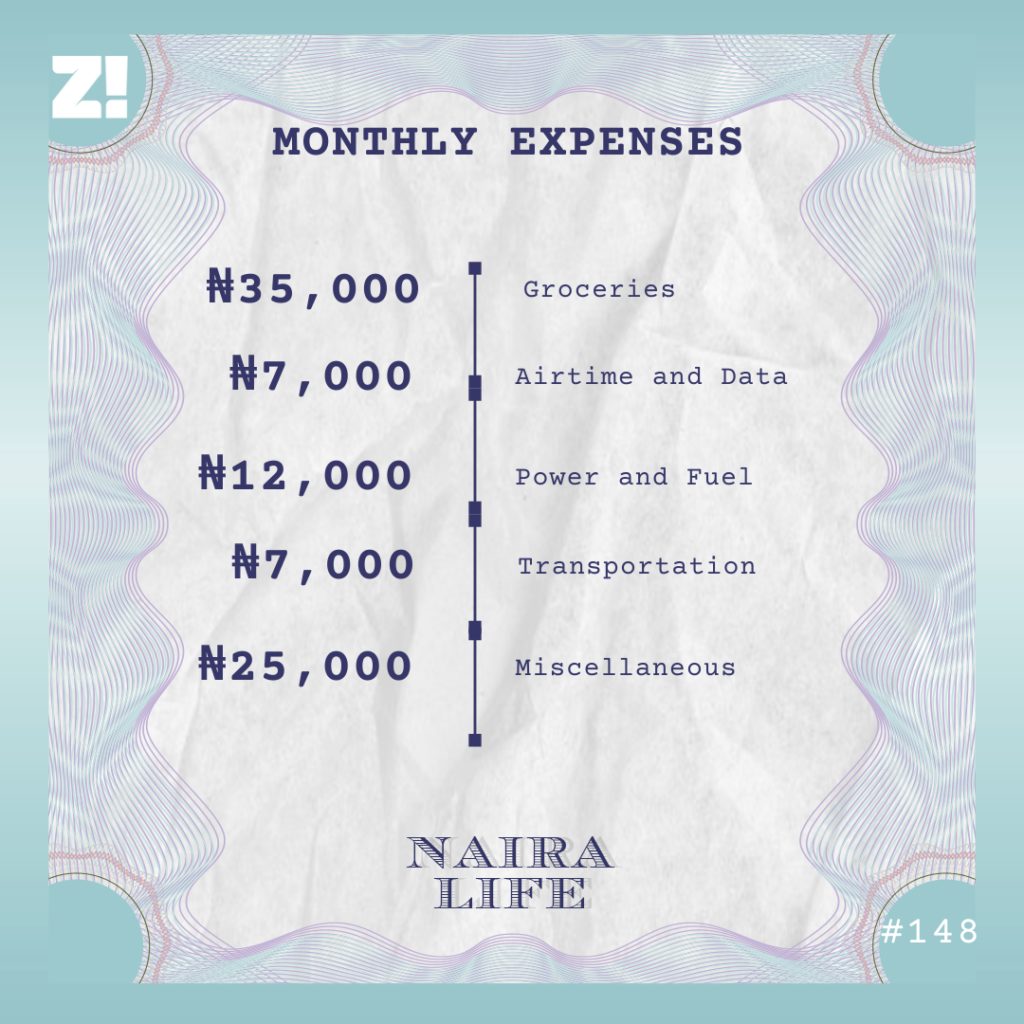
What do your savings and investments currently look like?
I have ₦2.6m in core savings at the moment. I recently liquidated my dollar savings for an investment opportunity.
Tell me about it?
I bought a 2004 Honda vehicle for hire-purchase, and it cost ₦1m. I expect to get ₦1.8m back when the repayment cycle is over.
Ah, I see. What about your other investments?
That’s about ₦7m at the moment.
RiseVest portfolio: ₦1.23m
Real estate value: ₦4m
Personal development: ₦1m
I joined a couple of people to invest in some startups at the beginning of the year and put ₦500k in it. My investment is worth ₦800k now.
Man, a lot has definitely happened in less than two years. How has this shaped your perspective about money?
The most important realisation, for me, is that money unlocks the potential to make more money. But this doesn’t happen in isolation — it has a lot to do with sound financial management. I know that as long as I can put the little money I have to good use, I’ll be fine.
How much do you feel you should be earning?
I believe I’m well paid, considering where I am in my career. It’s rare to find an entry-level job that pays this much. Of course, I earn less than the people who work with some other oil companies, but if there’s anything I’ve learned to be in the past couple of years, it’s content.
Word. What was the last thing you bought that improved the quality of your life?
I bought a couple of electronics and gadgets for my apartment in January, but my favourite purchase is my washing machine. The value I’m getting for the ₦130k I spent on it is unbelievable.
What about something you want right now but can’t afford?
A second nationality. If I have $150k to invest in the Bahamas now, I can get their passport. The thing is, after Germany didn’t work and I got this job, I decided to see what I could achieve here. As I earn more, my interest in travelling is increasing, but the Nigerian passport is a drawback. I aspire for a life where I can work in Nigeria during the week, travel to the UK to see Liverpool play at Anfield Stadium during the weekend, make a quick stop at France and get back to Nigeria in time for the new week.
Sounds lit tbh. What part of your finances do you think you could be better at?
I don’t spend enough money on myself. It’s like I get paid and the only thing on my mind is how much I can save and invest. I know life is short and it wouldn’t hurt to relax and enjoy my life as much as I can, but I also have long term goals I’d like to achieve, and I’d rather sacrifice for a bit if it means I’d get to them sooner.
Fair enough. How would you rate your financial happiness on a scale of 0-10?
8. I’m content with what I have. I believe I’m navigating my finances just right, and it can only get better from here. There is also no crippling family obligations, and this gladdens my heart so much. My mum is still working and earning a salary. While I send some money to her every now and then, I’m happy to do it and I know that she can live without it. My brother is currently in university, and he’s balling because my mum and I can afford to send him money. It doesn’t get better than this.

